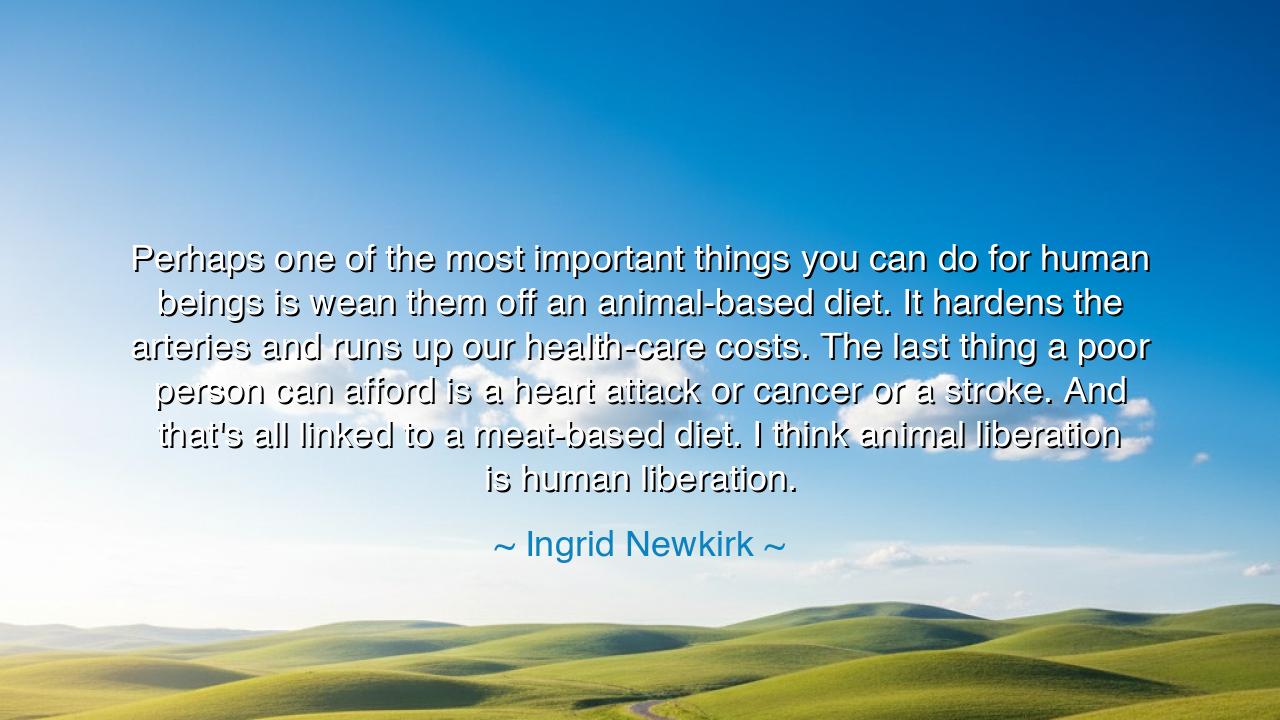
Perhaps one of the most important things you can do for human
Perhaps one of the most important things you can do for human beings is wean them off an animal-based diet. It hardens the arteries and runs up our health-care costs. The last thing a poor person can afford is a heart attack or cancer or a stroke. And that's all linked to a meat-based diet. I think animal liberation is human liberation.






Listen, O children of wisdom, to the words of Ingrid Newkirk, who speaks with clarity and conviction about the deep connection between the food we consume and the health of both humans and the earth: "Perhaps one of the most important things you can do for human beings is wean them off an animal-based diet. It hardens the arteries and runs up our health-care costs. The last thing a poor person can afford is a heart attack or cancer or a stroke. And that's all linked to a meat-based diet. I think animal liberation is human liberation." In these words, she reveals a truth that has been known to the ancients: the choices we make in our diet do not only affect our own well-being, but ripple outward, influencing the health of the community, the environment, and the future generations.
In the days of the great philosophers, the idea of living in harmony with nature was central to the pursuit of a virtuous life. Plato and Aristotle believed that the human body could only flourish when it lived in balance with the natural world. They understood that the health of the individual was not a separate thing, but was tied to the health of the community and the earth itself. To them, a diet rich in the fruits of the earth—vegetables, grains, and legumes—was the foundation for both physical strength and mental clarity. Ingrid Newkirk speaks to this same wisdom, reminding us that a meat-based diet, which harms the body and the earth, is ultimately detrimental not just to the individual but to the greater good of society.
Consider the great Roman statesman and philosopher Cicero, who, though he enjoyed the abundance of the Roman Empire, also spoke of the importance of balance in all things, including diet. He understood that indulgence in excessive foods, particularly those that came at the expense of others, was a form of greed that would harm the individual and the community. Cicero believed that true liberation and well-being came not from excess, but from moderation and respect for the balance of the world. Newkirk’s words reflect this principle: the animal-based diet that so many are accustomed to is not just an indulgence, but a contributing factor to illness and suffering—both for the individual and society at large. The path to health and human liberation lies not in feeding off the suffering of animals, but in embracing a more compassionate, balanced way of living.
In the ancient world, the healers and spiritual leaders often warned against the harm caused by indulgence in foods that led to disease and illness. In the Hindu tradition, for instance, the practice of ahimsa—the principle of nonviolence—was not only a moral guideline but a health practice. The sages believed that eating was a sacred act, and that food should be chosen not only for its nourishing qualities but for its ability to maintain balance in the body and the world. Ingrid Newkirk’s argument that animal liberation leads to human liberation echoes this ancient belief—that the violence inherent in consuming animal products has a ripple effect that harms not only the animals, but the consumers themselves, and ultimately the broader community.
The modern world has, unfortunately, become one in which convenience and indulgence often overshadow the wisdom of moderation. Newkirk rightly points out that the poor are often the most vulnerable to the consequences of a meat-based diet—for it is they who bear the brunt of heart disease, cancer, and stroke, illnesses linked to the very foods they can least afford to avoid. The irony of this, of course, is that those who can least afford the luxury of a healthy diet are the ones most at risk from the effects of a meat-based diet. This truth calls us to action, reminding us that true justice in society is not merely about the pursuit of individual health, but about creating systems that promote well-being for all. A plant-based diet is not only a choice for the individual but a social responsibility—one that helps protect the most vulnerable members of society from the health crises that plague our world.
There is a lesson here, O children, and it is one that the ancients taught us: the way we choose to nourish our bodies does not exist in isolation. Our choices affect not just our own health, but the health of the community, the animals, and the earth. Ingrid Newkirk calls us to recognize that the act of choosing a plant-based diet is not merely an act of self-care, but an act of compassion—for the world, for our fellow beings, and for ourselves. To liberate the animals from suffering is to liberate ourselves from the chains of illness, suffering, and environmental destruction.
So, O children, let us choose a life of balance, compassion, and well-being. Let us honor our bodies and our world by embracing a plant-based diet, one that promotes not just health, but justice, kindness, and sustainability. Just as the ancients understood that the pursuit of true health and liberation comes from living in harmony with the earth, so too must we. Animal liberation is indeed human liberation, for when we free ourselves from the cycles of harm, we free ourselves to live in a way that honors all life. Let us take this wisdom to heart, for it is in the choices we make today that we shape the world of tomorrow.






AAdministratorAdministrator
Welcome, honored guests. Please leave a comment, we will respond soon